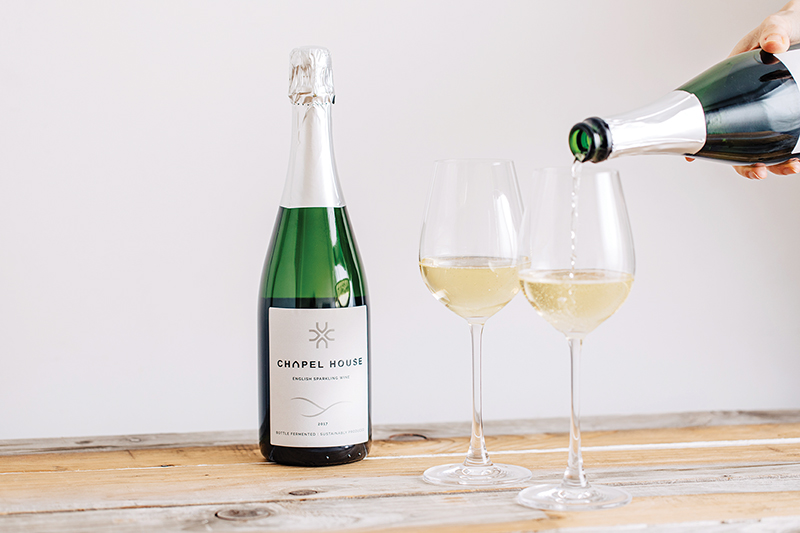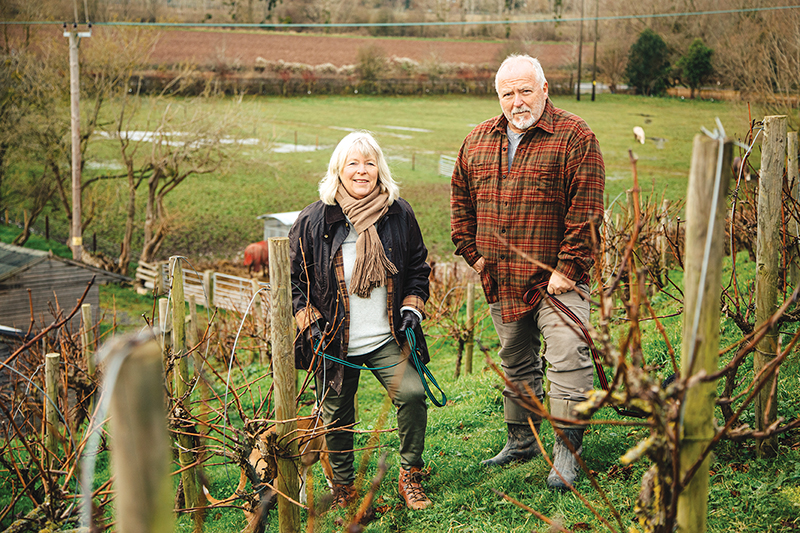A husband-and-wife team has given up their dentistry practice to grow a sustainable wine-making business at their family home in Worcestershire.
Judith and Tim Davies have launched Chapel House Vineyard at their home in the hamlet of Broadwas. They are tapping into the continued popularity of English sparkling wine and demand for responsibly-made tipples, building on a hobby they started 15 years ago.
A family-run business, Chapel House puts the protection of the “precious environment” first and foremost.
Every one of the 3,000 vines planted at the 2.5-acre vineyard nestled in the Teme Valley is unsprayed with chemicals and no heavy farm machinery is used in the cultivation process. Any electricity used in the growing process is generated by solar panels on the roof of Chapel House.
Once collected, the bunches of Seyval and Phoenix are loaded up and taken to Three Choirs Vineyard, just 21 miles away over the Malvern Hills, to be turned into wine.
Instead of glossy packaging, Chapel House wine makes its final journey to UK-only consumers boxed up in recyclable cardboard cartons.
“With help from our family, including our four children, we have always worked our vines by hand, without using any herbicides or insecticides,” said Judith, a former dental hygienist who worked alongside dentist Tim for 30 years. “We encourage plants and flowers to grow among the vines and respect the insects, both in the ground and on the vines. We are very aware of our precious environment and we do everything we can to protect it.”
Judith said they decided to expand the vineyard as a fully-fledged business venture after producing small amounts of wine for friends and family over the years: “We had a small area of hillside and had attempted to keep pet sheep and goats, but it wasn’t for us. Instead, we decided to have a go at planting vines. We knew it might be arduous as the hillside was so steep and we’d have to cultivate the vines by hand, but we went for it. We planted 400 vines and many a bottle of wine made with our grapes has been enjoyed over dinner since.”
Not wanting to spend time “twiddling our thumbs”, when the couple reached retirement they decided to turn it into a full-time venture, planting thousands of new vines over the other side of the hill.
Enjoying a mild climate, sheltered by the Malvern Hills, it is not the first time vines have been grown at Chapel House. Deeds and documents dating back to 1604 show that monks from the Worcester Diocese grew vines on the site, as well as apples for cider.
“Because our hillside is so steep, our older vines are trained in the ‘goblet vine’ style, as favoured by the Swiss, and we are possibly the only UK vineyard to use this method,” said Judith. “Growing vines this way promotes a slow, even ripening of the grapes, with good air circulation through the canopy. The grapes in our new vineyard over the other side are gloriously draped across trellises on a south-facing escarpment in the shape of an amphitheatre.”
Chapel House English sparkling wine is elegant, dry and crisp with subtle notes of bright green apples, pears and peaches.
The couple hope their wines will appeal to couples wanting to take their eco-conscious lifestyles down the aisle and those wanting a special occasion wine without the carbon footprint or air miles. The couple are also in talks with regional restaurants looking to showcase sustainable wines on menus.
In Spring 2020, Judith, originally from Bradford, and Tim, from South Wales, plan to open a tasting room in the grounds of Chapel House, which is mentioned in the Doomsday Book. Guests will be able to try the wines, look around the vineyard, hear the fascinating story behind the growing and production process, from grape to bottle, and uncover the history of the vineyard.





